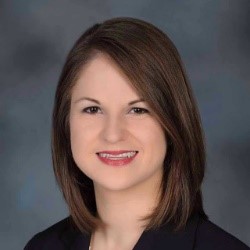‘It Could Be Weeks Before She is Able to Hold Her Baby’

Emily Miller, MD, MS, FAAP
April 28, 2020
I tried to mentally prepare for my first hospital shift after the start of the pandemic by giving myself a little pep talk.
I didn’t know what I was walking into because so little was known about the possible impact of COVID-19 in the NICU where I work. But I knew my colleagues in Louisville and elsewhere were in the same situation, and I would have to get used to this new normal.
So, I bypassed the neatly hung business casual clothes in my closet that I usually wore to work and grabbed a pair of scrubs from a pile. I slipped on a pair of sneakers, and I pulled my hair back into a simple ponytail, not my usual look for work.
I tried to calm my unspoken anxiety as I kissed my husband and four kids goodbye.
In later weeks, I would learn of colleagues elsewhere who got sick and died, and I would ask myself: Is today the day I won’t return home to my family?
I downed my coffee quickly, not wanting to risk taking it into the hospital. I used to bring coffee or a bottle of water to work, but now with the risk of exposure to coronavirus, there are restrictions on where we can consume food and drinks. Also, we can only take our face masks off in certain areas of the hospital.
I decided against listening to NPR’s morning report, my usual routine. I worried that the weight from the cascade of bad news about the coronavirus would break me.
My family of six had been gearing up for big life changes before the pandemic struck. I am a neonatal medicine fellow just three months shy of graduation, and after 10 years of medical training, I had accepted a new job in Cincinnati. My husband and I had plans to move, buy a house and enroll the kids in a new school. We’re still going, but the move will be a very different experience.
In the meantime, my husband and I have suddenly found ourselves homeschooling our older two children, 6 and 8, and have seen our income sliced in half due to my husband’s abrupt furlough.
I once carefully rationed my time with my four children, shuffling them to school, choir, Girls Scouts, sports practices, birthday parties and other activities.
Now I enjoy early morning coffee on the back porch with my rosy-cheeked 11-month-old daughter and accept a front yard bouquet of flowers from my rambunctious 3-year-old son. I recently watched my nervous 6-year-old ride her bike without training wheels for the first time.
Before I left for work on this particular morning, I took a deep breath.
I wouldn’t take off my mask very often during the next 28 hours, the duration of my shift. But the mask restricts air flow. Air trapped inside gets stale. It’s hard to breathe deeply.
At the NICU, I take care of premature and sick newborns. We’re taking care of more premature infants now. Their mothers were infected with the coronavirus at the end of their pregnancies, which caused respiratory distress. We’ve had mothers so sick that they couldn't breathe and had to be intubated and placed on ventilators.
Babies are delivered early because their mothers are not getting enough oxygen, which means their babies are being oxygen-deprived.
Instead of watching happily as new mothers and babies meet for the first time, I am rushing premature infants away from their infected, intubated mothers.
Some mothers aren’t aware that their newborn was delivered; some aren’t even conscious. Relatives aren’t allowed to visit because of risk of infection to the baby and other infants in the NICU. If she is infected and at home, the mom can’t even spend time with her newborn. It could be weeks before she is able to hold her baby.
Some families will be separated for an extended time due to quarantine restrictions. Anxiety is so high. Even when the mom is healthy at home, she often is afraid to visit, scared she could become infected elsewhere and expose her fragile baby. All the people who once shared in the excitement of a new baby -- aunts and uncles, grandparents, friends and cousins -- are not here. Now, there’s no one.
The coronavirus has infected the best parts of my job.
There is a lot of joy watching parents hold their babies for the first time and seeing infants get healthy and go home with their families. Those moments are why I went into this field. I am hopeful that this pandemic is short-lived and that we are all going to be safe and get through this so we can get back to those joyful moments.
I know I will be exhausted at the end of the day. I am terrified for the day I lose a patient or colleague. I am overwhelmed with the magnitude of it all. But I am unspeakably grateful to be part of this battle. And I am ready and willing to pull out another pair of scrubs tomorrow and do it all over again.
Send in your COVID-19 pandemic story, and we may share it here and on our social media channels. https://bit.ly/2XVvJIu
*The views expressed in this article are those of the author, and not necessarily those of the American Academy of Pediatrics.
About the Author
Emily Rath Miller, MD, MS, FAAP
Emily Rath Miller, MD, MS, FAAP, is a Neonatal-Perinatal Medicine Fellow in the Department of Pediatrics at the University of Louisville School of Medicine and University of Louisville Physicians Neonatal Follow-up Clinic.